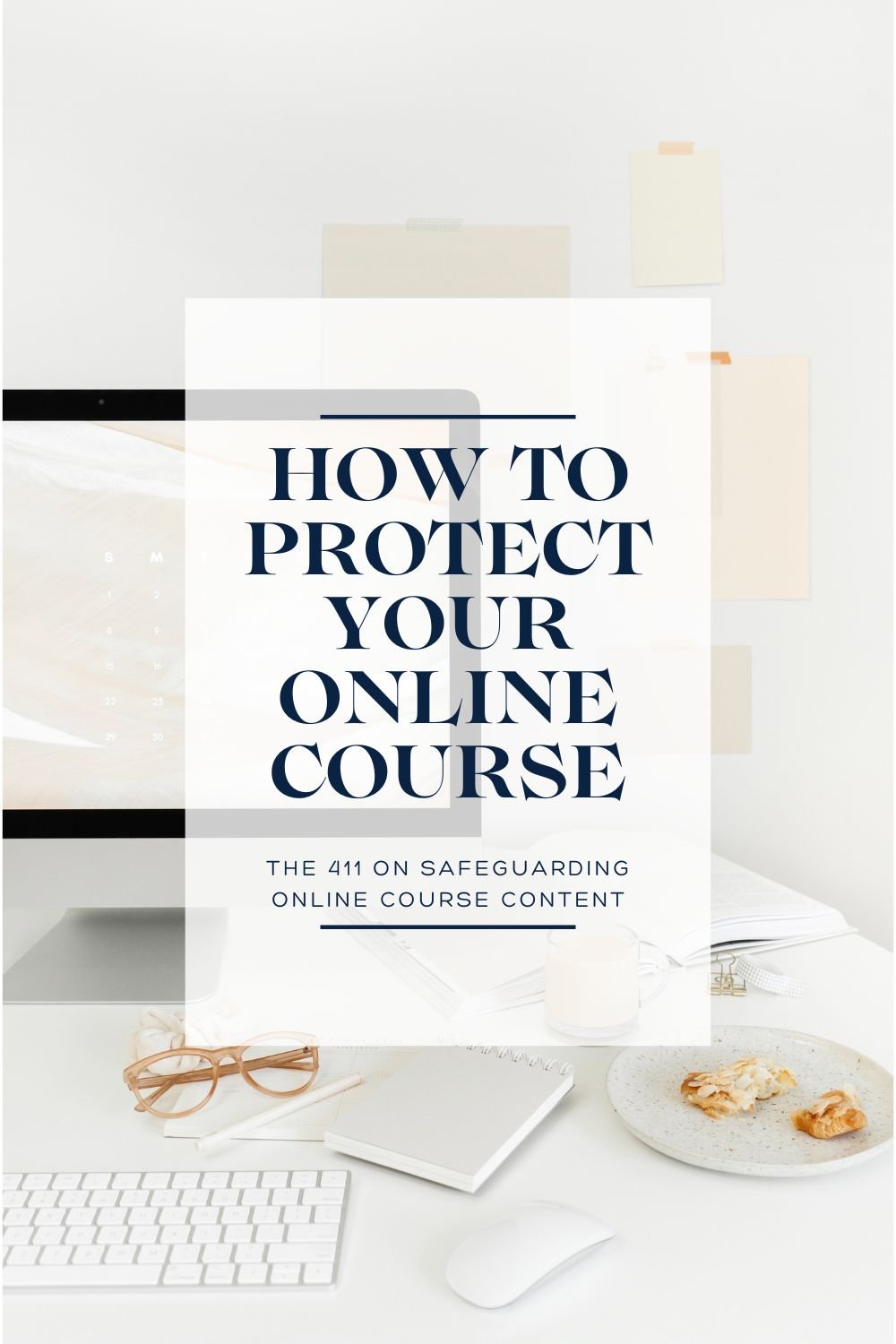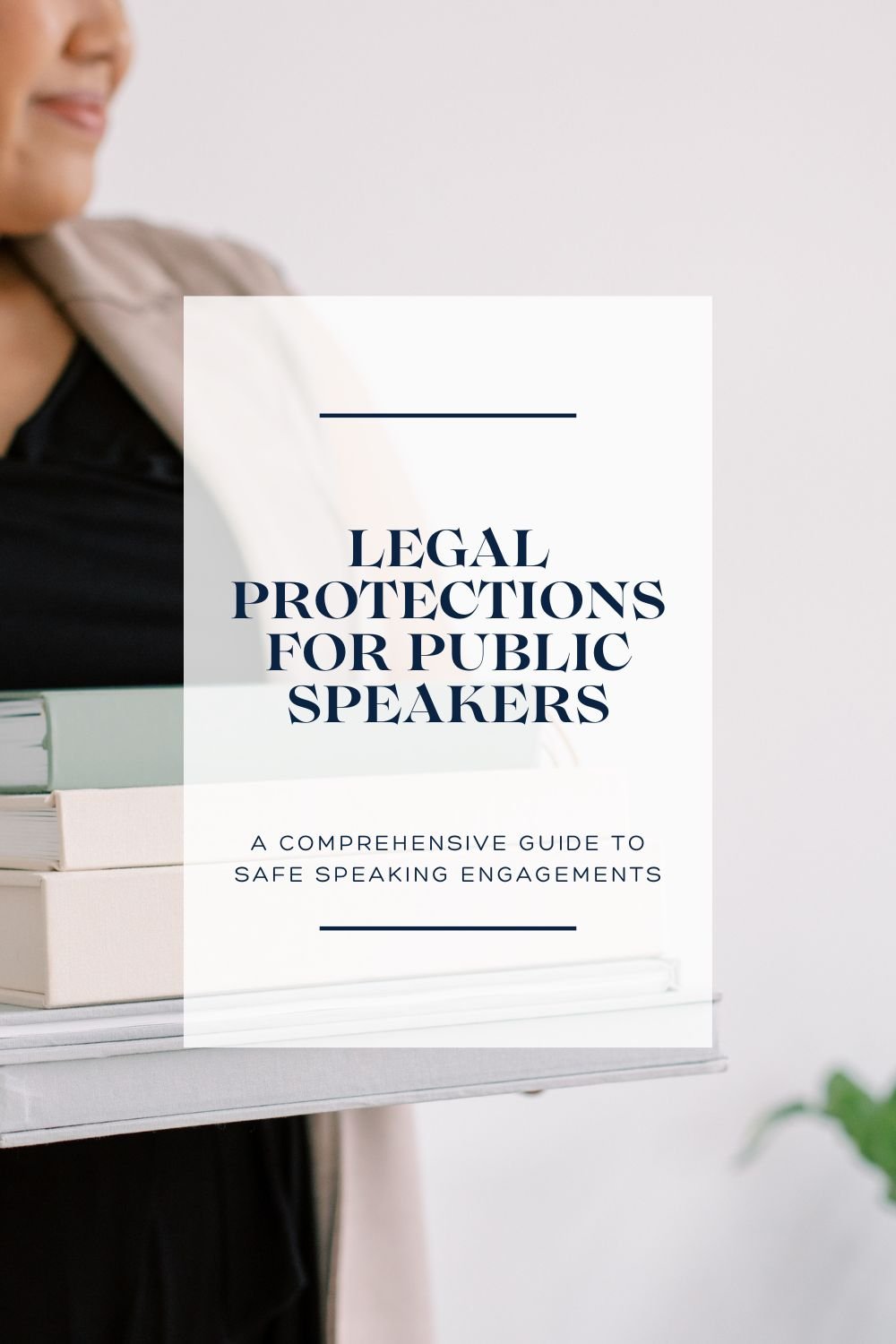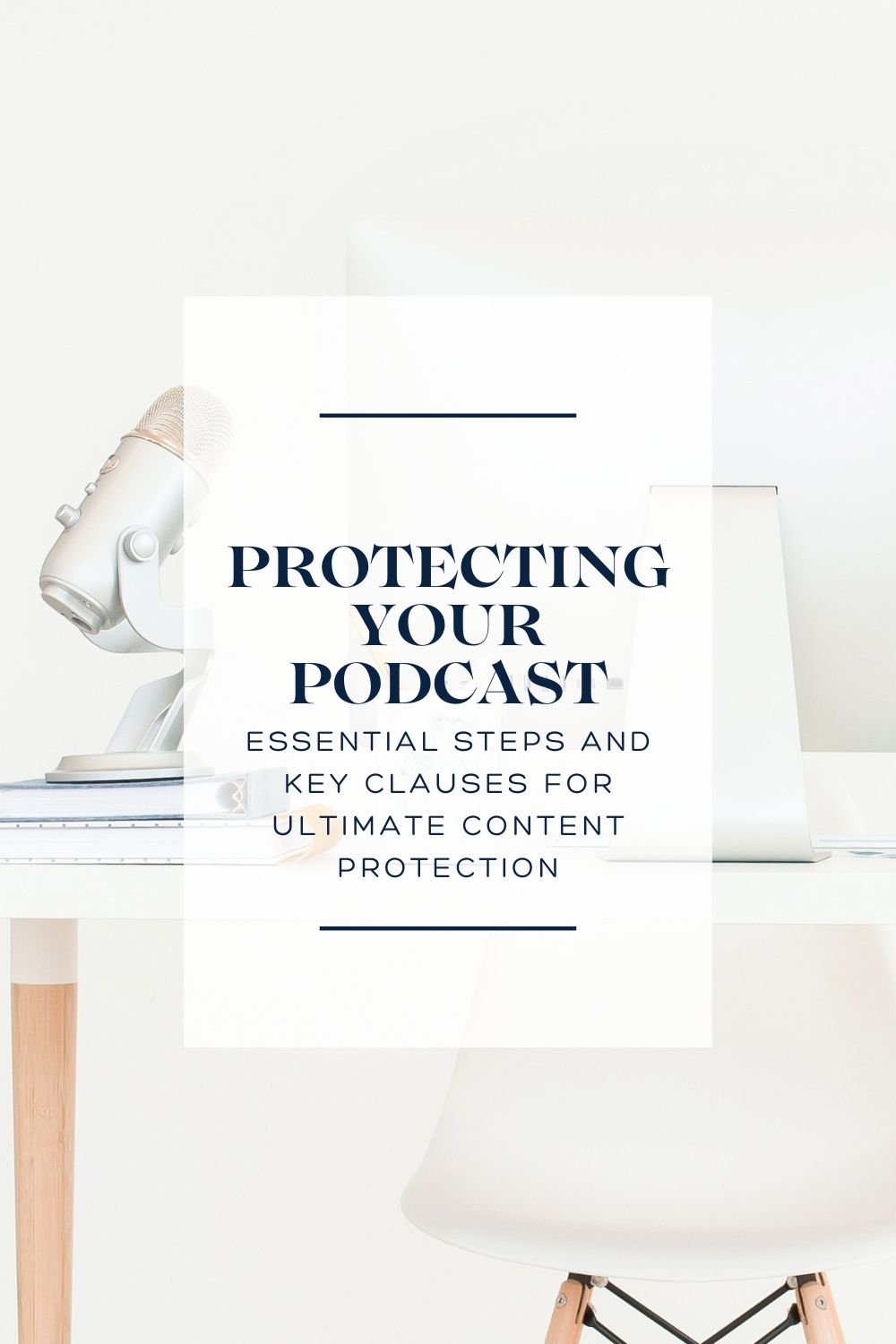Legally Protect Your Online Course: The 411 on Safeguarding Online Course Content
Hi there, dreamers & dynamos,
Welcome to Protecting Your Online Course 101.
Today we are answering everyone's burning question: How to legally protect your online course.
Alright, get comfortable, grab your fuel (be it black coffee, green tea, or taurine-packed energy drinks) - we're diving into the wild, wild web of online courses today. And it's not just about creating content that sets learners' minds on fire (because I already know that you have that covered!).
Nope. Today, we're playing defense and discussing how to legally protect your precious course content.
Get ready, it's about to get legal up in here!
The Wild West of Online Courses
First off, online courses are a whole new ballgame for many service providers. Y'see, when it comes to typical coaching or creative services, you've got the advantage of screening potential clients like Sherlock in a sea of suspects. You get a chance to figure out if you're a match made in business heaven. You get to answer burning questions like - "Is this customer right up my alley?" or "Are we gonna groove well together?" You even get a go at sorting out the payments. Cash? Credit? Cryptocurrency? Barter system, anyone?
Online courses, however, are a different beast. Like a vending machine (but way cooler), these courses typically sell passively. Which is amazing! But here's the catch - it also means there's less opportunity to screen your consumer.
Misaligned Goals
Just imagine - your next student could be someone who's got goals misaligned with what your course intends to offer! For example, I have a wonderful online kettlebell trainer (I can send you her details, just ask, she's amazing!). Her focus in building functional strength to make life easier. She does NOT focus on weight loss, it might happen, it might not. So imagine how annoyed a custmer who wants weight loss will be if she ends up in my trainer's course and imagine how frustrated my coach would be. Match NOT made in heaven.
Straight-up Thievery
Or even worse, they might have some sneaky plans to pull a straight-up heist - copying your content or doing some light unauthorized sharing (mention it in a whisper, "stealing your content").
Payment Problems
Oh, and let's not forget - it may just so happen that the said buyer can't keep up with future payments, a scenario as sticky as some of Aunt Mabel's famous fruit preserves. Online courses often come with payment plans and, my friend, the struggle is real when those credit alerts stop coming.
Now, I hear you - "But can't we pre-qualify course buyers through marketing materials or sales calls?" Yes Sherlock, you're right! But the precision is a bit like shooting a three-pointer with a bowling ball - not quite the same as a regular client-onboarding process.
The Perks of Online Courses: A Little Pep Talk
Now, don't start biting those nails just yet. It's not all doomsday prophecy over here. Online courses can be a goldmine for businesses. Here are just a few nuggets of goodness to consider:
Passive Incomes: Imagine earning while you're chilling on vacation. Yep, that's the dream!
Broadened Reach: Say adios to geographical barriers. Hello world!
Scalability: One course, hundreds of students. Need I say more?
Evergreen Content: Create once, reap benefits for years.
Armed with all these sweet pros, it's definitely worth protecting these digital treasures. Trust me!
Your Security Playbook: How to Legally Protect Your Online Course
Here's the plan: we proactively safeguard your content and prepare for any potential "court-side" showdowns. Now, this ain’t about being paranoid, but when it comes to your intellectual property, it’s the right kind of “overprotective parent” vibe.
Love This Info? Check Out Related Articles:
The Nitty-Gritty Details
Pssst... here's the magic word for today - Terms of Use (also known as an Online Course Agreement). It's your knight-in-legal-armor that will help you protect your online course like the crown jewels! This agreement is like your client contract for your online course(s). If you need help with this, check out my DIY legal template shop for a Terms of Use drafted by a Columbia Law graduate - hey, that's me!
So buckle up, cause we're about to dive into the nitty-gritty!
Step 1: Embedding the "Terms of Use" at Checkout
Imagine this Terms of Use as a mighty gatekeeper, ensure it stands tall right at the point of checkout on your sales platform. Not in a maze-like search for terms and conditions, no siree! Your customers should be required to engage with this genie in a box, ticking it to acknowledge they’re cool with abiding by your Terms of Use. Don't let your course software pre-check the box, the customer should have to affirmatively check it in order to check out. The box should clearly state the customer "acknowledges and constens to the Terms of Use of XYZ company." A golden rule here is: make the full Terms of Use available for them to leaf through right then and there. You should provide a clickable link that allows the customer to read your Terms of Use directly from the checkout.
With this consent checkbox, you’d have covered your behind more snugly than granny’s knitted socks in winter.
Savvy Business Owner Tip: Share the Terms of Use EVERYWHERE
Share the Terms of Use left, right, and center! Include it in your welcome email, link to it in your courses, shower your learner with reminders! The goal is - Leave no room for any "I didn't know that!" exclamations.
Essential Elements for a "Terms of Use" Agreement
Creating a Terms of Use does not need to be as complicated as calculus. Remember that you've got the freedom to tailor this to suit your unique business needs. But for starters, here are some non-negotiables and remember the goal is always to crystal clear:
Exact Description of Purchase
Be clearer than a mountain stream about what the customer is buying. They need to know how long they’ve got access, what platforms they can use, whether there’s a fancy community group in the mix, or if they’re entitled to bonuses. Don't leave any room for any surprises or confusion.
Payment Deets:
Ensure you cover the amounts due, payment plan options (if available), schedules, accepted payment methods, and repercussions for missed or late payments. Missed or late payments are likely to be your biggest course challenge so get really granular here. Be clear on how late is considered late, how many times you will accept a late payment: is it 1 strike and they're out? Do they lose access? For how long? Can they restore access? Is there a late fee or penalty? Put it all in there. It's no game of hide and seek. Lay it all out clearly like you're explaining Netflix to Grandma.
Communication Protocol and Notifications:
Outline how you’ll reach out to customers and how they can contact you. Give them an estimated response time, but remember it's not a race, so be realistic about your timings!
Refund Policy:
Include a carefully written refund policy. Don't be that sketchy online store that vanishes when someone mentions "refund"! It's fine to have a "no refund" refund policy but make sure to spell it out. And, if you are, offering refunds be sure to explain how long they are available for, what qualifies for a refund, how the client should contact you and what info do they need to include, and how much the refund will be for.
Intellectual Property Ownership Provision:
Lay out clearly that your course content is your intellectual property, and they do not have the rights to resell, redistribute, or misuse it. This makes it easier to shoo away any content kleptomaniacs!
First things first, let's state the obvious: you OWN that course content. You're the mastermind, the creative genius, the original course-creator-extraordinaire! Make sure your intellectual property clause states that loud and clear.
Ever had someone steal your lunch from the office fridge? Infuriating, right? Well, imagine someone swiping your hard-earned course content and then sharing, selling, or redistributing it like it's a viral cat video. No, we ain't letting that happen, folks! Make sure your clause prohibits sharing, selling, or any other sneaky shenanigans involving your content.
Look, we're all for sharing and caring, but when it comes to your course logins, let's be cutthroat! Lay down the ground rules and make it clear that sharing the login is a BIG no-no. Customers who decide to act like Robin Hood with your course logins should know they risk losing access faster than you can say, "LOGIN THIEF!"
Don't be shy about brandishing your legal wand. Let 'em know you mean business by stating that you'll protect your intellectual property rights to the fullest extent of the law. That should send those would-be content thieves running for the hills.
Bonus Tip: For serious protection, be sure to register your online course content to the US Copyright Protection Office (you can submit a batch of content to register at once: check this article for details). This will give you a registered copyright (not just a Commonlaw one) which is much more defensible if it comes to court.
Bonus Bonus Tip: Look into using locked PDFs for all course documents and using hosting sites that don’t allow video downloads. This make it much more challenging for a thief to duplicate your content.
The Ins and Outs of Gaining (or Losing) Access
Your online course ain't an all-you-can-eat buffet, so you've got to ensure you lay down the law for access privileges (think bouncer with a clipboard). Explain the When, How, and Why a Customer Loses Access to the Course: Life happens, but so do responsibilities. Be crystal clear about why users might lose access (e.g., late payments, rule violation), and the process for this ban hammer drop.
Tough love time! If there's a way to get access back, let them know the rules of redemption. If there's no return ticket, make that known loud and clear. You're the course boss, after all.
Sharing is NOT Caring When it Comes to Course Access
Now, let's talk about unwelcomed guests (a.k.a., the shared login situation). Like a viral TikTok dance gone wrong, you don't want your eCourse falling into unwanted hands.
Tell your customers you're monitoring for party crashers using someone else's login! Lay down the consequences if you bust any login bandits. That's right, no sharing, copying, or impersonating login info.
Keepin' the Vibes Positive: Community Rules and Behavior Expectations
If your course boasts a group get-together element (like a Facebook tribe or Circle shindig), you'll need The Party Guidelines. Cover the lowdown on behavior expectations. After all, ain't nobody got time for negativity!
Make it plain any unwanted behavior (think self-promotion, offensive content, etc) will result in the user being shown the door with your business having the final say on booting violators. You're the DJ of this community, my friend.
Remberberino: Keep your legal counsel-like BFF on speed dial when drafting your agreement. Laws and in-laws can be a tricky bunch! 🕵️♀️
Keep being your awesome course-creator self while making your digital fortress stronger than ever! Keep slaying, and, as always, protect your online course. 🏰
Just like your 10th Grade English Teacher Said: You Need to Review & Revise
The internet landscape is as changeable as a chameleon on a rainbow, which makes reviewing and updating your legal documents akin to buying fresh milk. No one likes expired milk or outdated legal terms. So, let's review those "Terms of Use" pretty frequently, shall we? Once every quarter is an ideal timeline or whenever a client issue arises.
Tell 'Em Loud, Tell 'Em Proud
Delivering your updated Terms of Use to your continuing members is essential. You've got to get it out to everyone ASAP.
The solution lies in a well-crafted email, that doesn't make your audience embark on a digital archaeological dig to find the changes. Nobody got time for that, so dish up the update in the body of your email.
And there you have it - a beginner's guide to protect your online course, with the help of a robust Terms of Use or Online Course Agreement. You're now ready to brave the digital realm with newfound confidence.
Conclusion: How to Protect Your Online Course
Remember, not every misstep is a catastrophe. With the right protective measures in place, even the wildest of online course terrains can be navigated safely. Let's soldier on, course creators, empowering others and strengthening our businesses, one checkbox at a time!
Ninja-edit: Always consult legal counsel or use reputable legal template (cough: Kerry Carroll LLC offers those right on this very site :cough) while drafting such an agreement. The internet is big, but the law is bigger!
THIS ARTICLE IS NOT A SUBSTITUTE FOR LEGAL ADVICE AND IS OFFERED FOR INFORMATIONAL PURPOSES ONLY. EVERY SITUATION IS UNIQUE AND YOU SHOULD CONSULT A LOCAL ATTORNEY FOR ADVICE ON YOUR PARTICULAR CIRCUMSTANCES.






Unravel the world of mastermind groups with a legal twist! Dive into the essentials of intellectual property, payments, and how masterminds differ from group coaching. We'll discuss the must-have legal clauses to ensure you and your participants are protected. A must-read for savvy entrepreneurs gearing up for success!